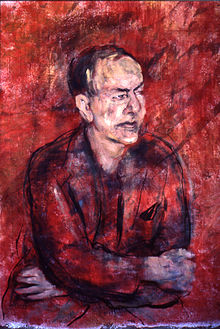Herbert A. Simon
| Herbert A. Simon |
 |
| Born |
Herbert Alexander Simon
(1916-06-15)June 15, 1916
Milwaukee, Wisconsin, USA
|
| Died |
February 9, 2001(2001-02-09) (aged 84)
Pittsburgh, Pennsylvania, USA
|
| Nationality |
United States |
| Fields |
Artificial Intelligence
Cognitive psychology
Computer science
Economics
Political science
|
| Institutions |
Carnegie Mellon University
University of California, Berkeley
Illinois Institute of Technology
|
| Alma mater |
University of Chicago |
| Doctoral advisor |
Henry Schultz |
| Other academic advisors |
Rudolf Carnap
Nicholas Rashevsky
Harold Lasswell
Charles Merriam
John R. Commons
|
| Doctoral students |
Edward Feigenbaum
Allen Newell
Richard Waldinger
John Muth
William F. Pounds
|
| Known for |
Logic Theory Machine
General Problem Solver
Bounded rationality
Satisficing
|
| Influences |
Richard T. Ely, John R. Commons, Henry George, Chester Barnard, Charles Merriam
|
| Influenced |
Daniel Kahneman, Amos Tversky, James March, Allen Newell, Philip E. Tetlock, Richard Thaler, John Muth, Oliver E. Williamson, Massimo Egidi, Vela Velupillai, Ha Joon Chang, William C. Wimsatt, Alok Bhargava
|
| Notable awards |
Turing Award (1975)
Nobel Prize in Economics (1978)
National Medal of Science (1986)
Harold Pender Award (1987)
von Neumann Theory Prize (1988)
APA Award for Distinguished Scientific Contributions to Psychology (1969)
APA Award for Lifetime Contributions to Psychology (1993)
ACM Fellow (1994)
IJCAI Award for Research Excellence (1995)
|
| Spouse |
Dorothea Isabel Pye (1939-2001, his death) (1913-2002) |
| Children |
Katherine, Peter, Barbara |
Herbert Alexander Simon (June 15, 1916 – February 9, 2001) was an American political scientist, economist, sociologist, psychologist, and computer scientist whose research ranged across the fields of cognitive psychology, cognitive science, computer science, public administration, economics, management, philosophy of science, sociology, and political science, unified by studies of decision-making.
Simon was among the pioneers of several of today's important scientific domains, including artificial intelligence, information processing, decision-making, problem-solving, organization theory, complex systems, and computer simulation of scientific discovery. He coined the terms bounded rationality and satisficing, and was among the earliest to analyze the architecture of complexity and to propose a preferential attachment mechanism to explain power law distributions.
Simon received many top-level honors in life, including the Nobel Prize in Economics in 1978 and the Turing Award in 1975. He also received honorary degrees from various universities, such as from Harvard University. As of 2016, Simon was the most cited person in Artificial Intelligence and Cognitive Psychology on Google Scholar. With almost a thousand highly cited publications, he was one of the most influential social scientists of the twentieth century.
...
Wikipedia

